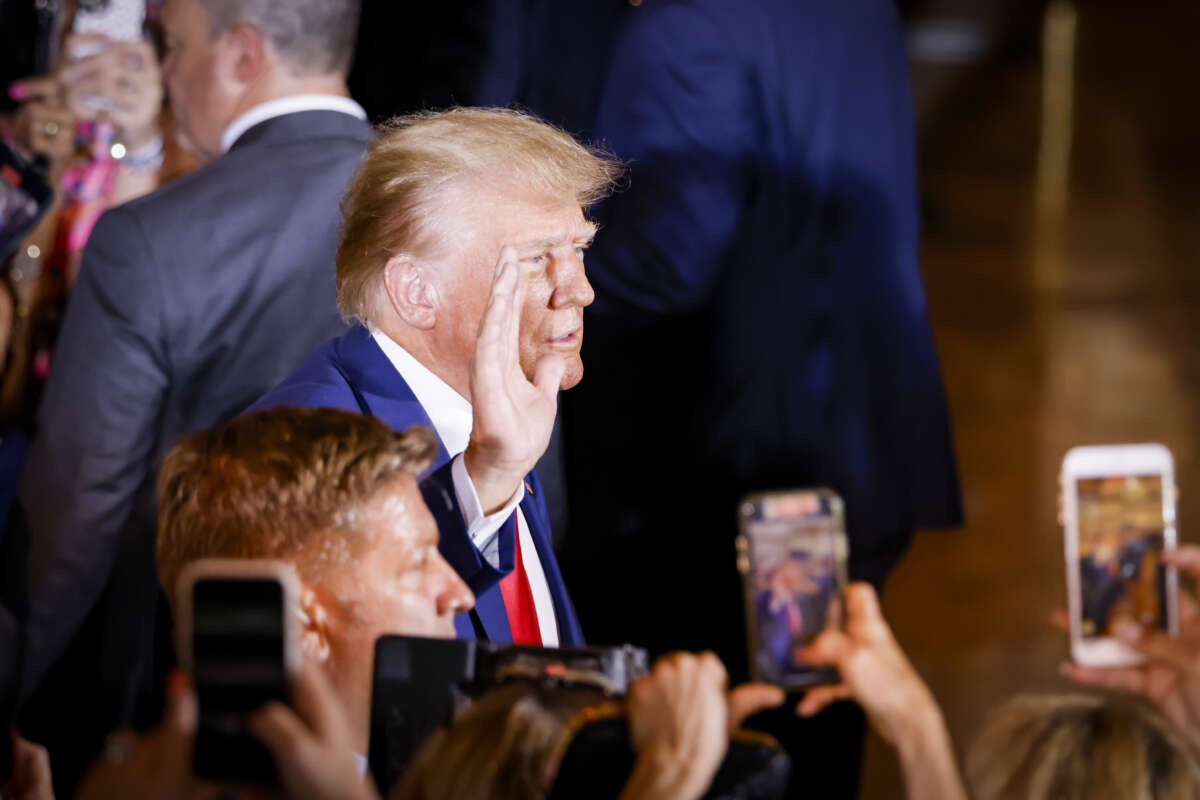Hours after becoming the first former president to be indicted in U.S. history, Donald Trump gave a rambling speech at Mar-a-Lago, presenting himself as a victim of the political establishment and airing grievances about his perceived enemies in what appeared to be an attempt to rally his followers for his 2024 presidential campaign.
Trump has been indicted by the Manhattan District Attorney’s office on 34 counts of falsifying business records related to his hush money payments to three individuals — an adult film actress, a former Playboy model, and a former Trump Tower doorman in New York, all of whom the president allegedly paid to keep silent about his extramarital affairs before the 2016 election.
Trump spent much of his 25-minute speech on Tuesday evening peddling claims that had nothing to do with his indictment, including false claims of voter fraud in the 2020 presidential election. He also alleged that his 2016 campaign was spied on by the Obama administration.
“I never thought anything like this could happen in America,” Trump said at the start of his speech. “The only crime I’ve committed is to fearlessly defend our nation from those who seek to destroy it.”
When Trump did discuss the indictment, he repeatedly attacked the integrity of Manhattan District Attorney Alvin Bragg, describing him as a “Soros-backed” prosecutor — an oft-used antisemitic trope — and accusing him of attempting to interfere in the 2024 presidential election.
Trump claimed his political opponents were behind his indictments, telling his audience that they had “stepped up their efforts” by charging “the 45th president of the United States” with crimes related to the hush money payments. (Trump has denied having extramarital affairs, but has admitted to making payments to at least one of the people he allegedly had an affair with.)
The former president also brought up other investigations into his alleged wrongdoings.
Trump called special counsel Jack Smith, who is leading two Department of Justice (DOJ) investigations into his actions — one regarding his role in the January 6 attack, and one regarding his improper transfer of White House documents to Mar-a-Lago — a “lunatic bomb thrower.” He described Fulton County, Georgia, District Attorney Fani Willis, who is considering charging Trump with crimes relating to his attempts to overturn the state’s presidential election, a “racist.” And he derided a civil lawsuit from New York state Attorney General Letitia James, mocking her for campaigning on holding him accountable.
Trump called Judge Juan Merchan, who is overseeing his Manhattan-based indictments, a “Trump-hating judge,” and questioned his ability to be impartial because his daughter once worked for Vice President Kamala Harris. Legal experts have said that such claims are unwarranted; judicial author Steven Lubert, for instance, told Politico that Trump hasn’t presented any reasonable or legitimate “grounds for [Merchan’s] disqualification.”
At Trump’s arraignment today, Merchan called on Trump’s lawyers to remind him to “please refrain from making comments or engaging in conduct that has the potential to incite violence, create civil unrest, or jeopardize the safety or well-being of any individuals.”
Trump concluded his speech by promising to “make America great again” in 2024.
Numerous networks opted to stop broadcasting the former president’s speech once it became clear that he was using his airtime to push unfounded conspiracy theories rather than to address the charges he received on Tuesday.
“Trump Tuesday night was seething and tired and meandering, cycling through an already recycled greatest-hits list of perceived slights and grievances,” Washington Post senior national political correspondent Ashley Parker said on Twitter.
“Trump is like a worn out professional wrestler at ringside insulting and threatening his opponents with the same old script, seeking the applause of his audience who’ve seen this same tired performance hundreds of times,” former law professor Christopher Moore said in response to the speech.
Bill Burton, a former White House deputy press secretary who served in the Obama administration, gave Trump bad grades on both substance and performance.
“This is the worst I’ve ever seen Trump,” he said.
Media that fights fascism
Truthout is funded almost entirely by readers — that’s why we can speak truth to power and cut against the mainstream narrative. But independent journalists at Truthout face mounting political repression under Trump.
We rely on your support to survive McCarthyist censorship. Please make a tax-deductible one-time or monthly donation.
